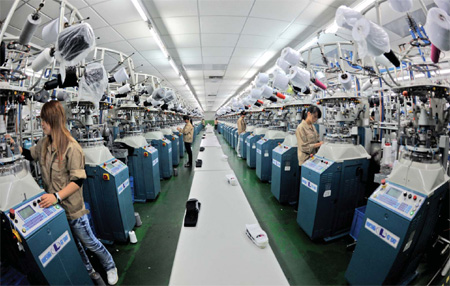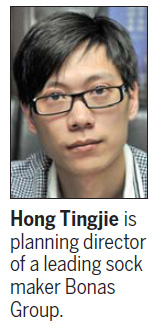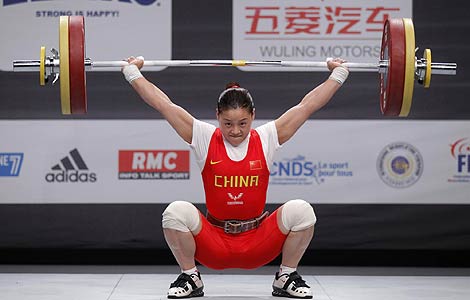Finding the right fit
Updated: 2011-11-11 09:05
By Yan Yiqi (China Daily)
|
|||||||||
|
Yiwu, the sock capital of China, has more than 1,000 sock companies, and some of them, including Langsha and Bonas, have established their own brands. [Photos by Zhang Jiancheng / for China Daily] |
|
|
Yiwu sock makers turn to brand building as OEM starts losing its shine
After years of basking in the limelight as a leading original equipment manufacturer (OEM) for global sock brands, Yiwu, a city in Zhejiang province, is moving up the value chain by focusing on building strong brands, rather than boosting exports. The predominantly export-oriented city in eastern China, also known as the socks capital, used to supply more than 3 billion pairs of socks for big global retailers such as Walmart, Pringles and Disney every year till 2010. But this year things have started to change dramatically. Hong Tingjie, planning director of Bonas Group, a leading socks maker from Yiwu, says his company turned down a large export order from Walmart recently as part of its new strategy. ��That was a large OEM order, but we want to focus on the domestic market with our own brand,�� Hong says. With reported sales of 500 million yuan ($78.75 million, 57 million euros) last year, and the outlook for the current year not so rosy, Bonas decided it was time to move away from being a manufacturer for big brands and retail chains.
High labor and material costs, shrinking export margins and dwindling export orders from major markets like Europe and the US, have made manufacturers realize that it was no longer prudent to put all eggs in the export basket. On the other hand, the companies also realized that in an increasingly crowded and intense marketplace, it was essential to have strong brands to stay afloat.
Yiwu, with an annual production of 8 billion pairs of socks, is also where nearly 80 percent of the over 20 billion made-in-China socks are sold.
"There is a saying that the Guangdong province was the industrial center in China during the 1980s, and in the 1990s it was Zhejiang. While it is still too early to say that Yiwu would occupy the slot in the 21st century, we are confident of the future as we are generating enough global vibes to make it a reality," says Jin Shanfu, secretary-general of Yiwu Socks Industry Association.
More than dwindling export orders, it is rising labor and material costs that have proved daunting for many sock companies in Yiwu.
With just 30 sock machines that were imported from Italy and 40 workers, Dielian Socks is one of the sock factories in Yiwu that still relies on OEM manufacture.
"Self-branding is a good dream, but for a small factory like us, the complicated market structure and huge marketing expenses are unaffordable," says Wu Jianming, general manager of Dielian.
Founded in 2005, Wu's company has been getting orders from foreign customers such as Puma, adidas, Pierre Cardin, and of course, some Eastern European brands that he himself cannot name.
He says the price of cotton, the main material for making socks, has risen 70-80 percent since the beginning of this year. "We had to increase product prices due to higher labor costs and the continuous appreciation of the yuan. But unfortunately, the strategy did not go down well with most of our clients," says Wu.
Jin says business for sock OEM companies this year is more difficult than in 2008.
"Sock prices rose 20 percent after the financial crisis began in 2008, while order numbers grew 15 percent. But this year, the overseas financial circumstances are so complicated that I am afraid we will see a decline in revenue," Jin says.
But amid the gloom, Jin says there has been one bright spot for the industry: the growing number of imported sock machines in Yiwu. There are now more than 1,000 sock companies and factories in Yiwu, with over 80,000 workers and more than 50,000 socks machines imported mostly from Italy and Germany.
"The number of imported machines in Yiwu is growing by 5,000 every year. We are also able to ensure the quality as the imported machines are the best in the business," Jin says.
But a major hindrance for industrial transformation of most OEM companies is the lack of original designs. To get around this problem, Yiwu sock producers have been looking for ways to team up with international fashion designers.
Bonas has set up a fashion workshop for eight designers in Milan, led by Andrea Dal Prato, who has also worked with European brands like Tetra Pak, Wella and Gamma & Bross.
Every season, Prato and his team send Bonas drafts of 200 to 300 new designs of socks for Asian women.
"Four years back, when I first came to Yiwu to participate in the Yiwu International Commodities Fair, Bonas caught my attention, and later, it was recruiting Italian designers in Milan. That was the beginning of our long-time relationship," says Prato.
Prato says he believes his alliance with Bonas will be one of the most significant of his career, and he is more than pleased to design socks for Asians.
In Yiwu, almost all socks companies that have established their own brands have hired at least one fashion designer from the international field, not only for Chinese consumers but for international ones as well.
Every year, Zrinka Wergeland spends three weeks walking along the stalls in the 1.43 million square meter market in Yiwu, searching for the most up-to-date socks. Owning a small shop of no more than 15 square meters in Croatia, her homeland, Wergeland has been mainly selling socks for women, for the past seven years.
She says the socks she buys from Yiwu are well received in Croatia, and her shop sells more than 300 pairs every month.













